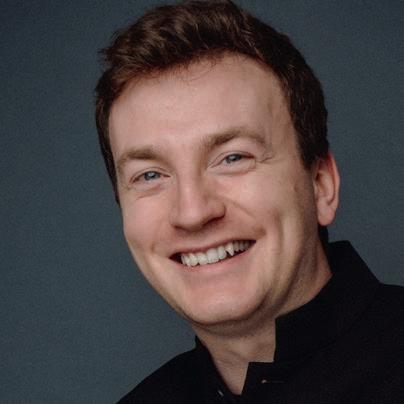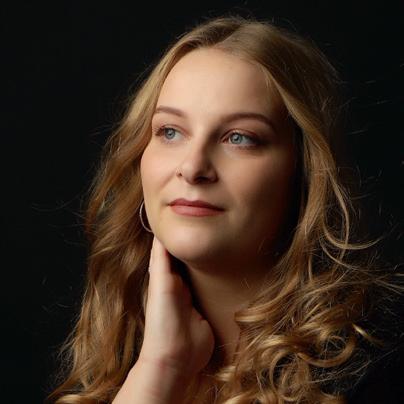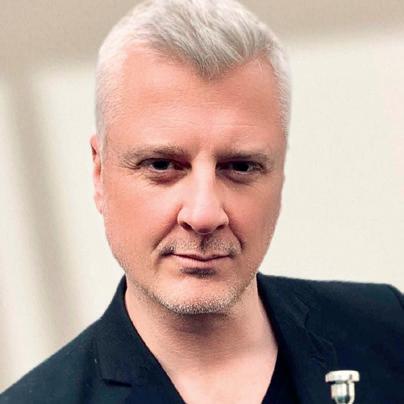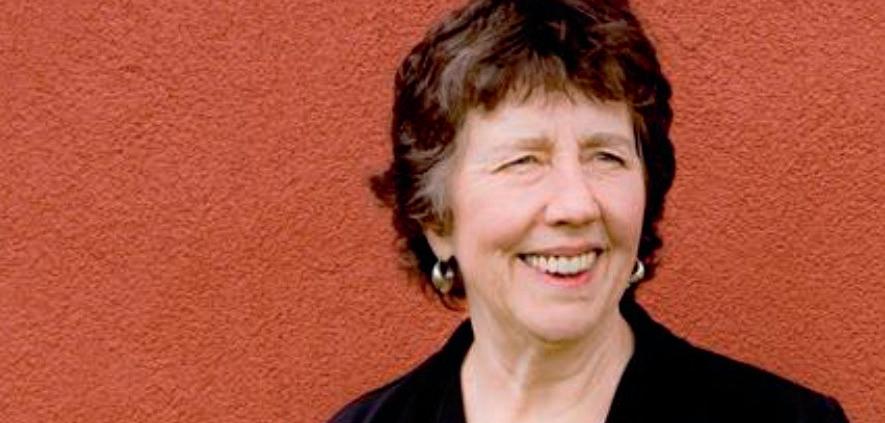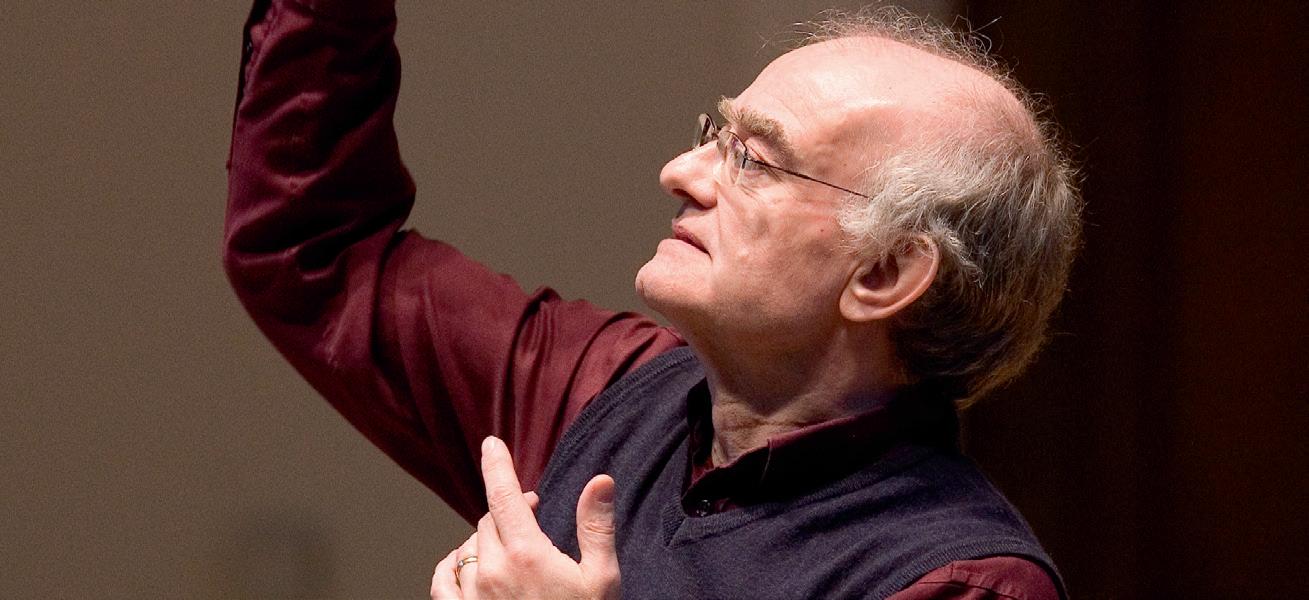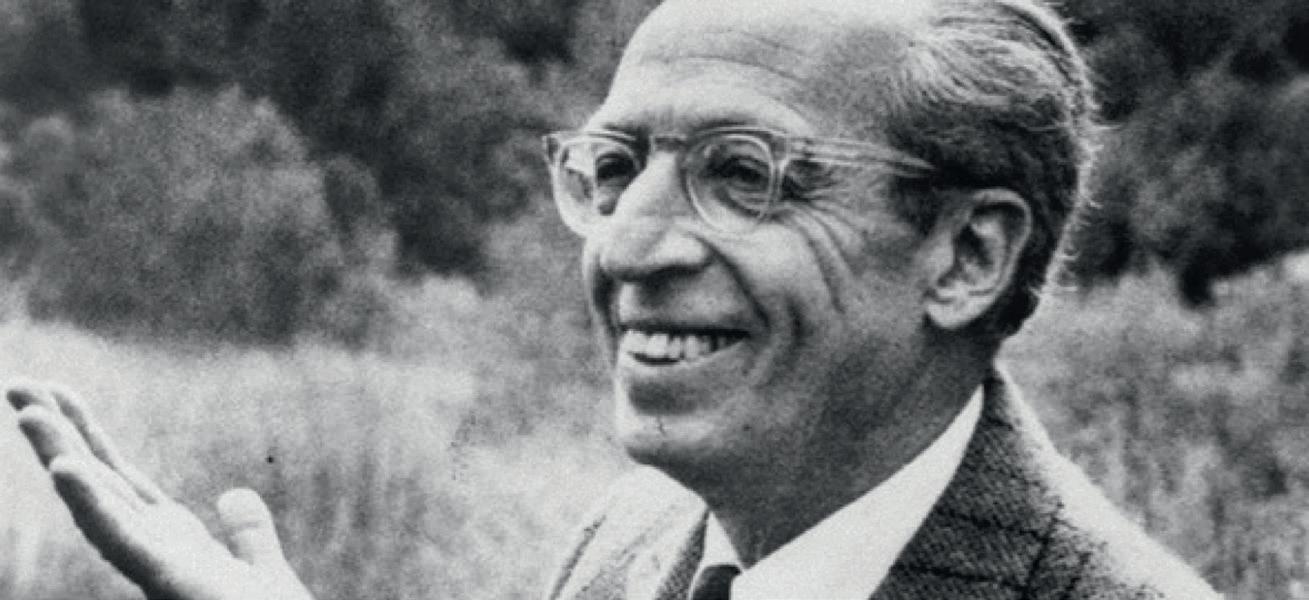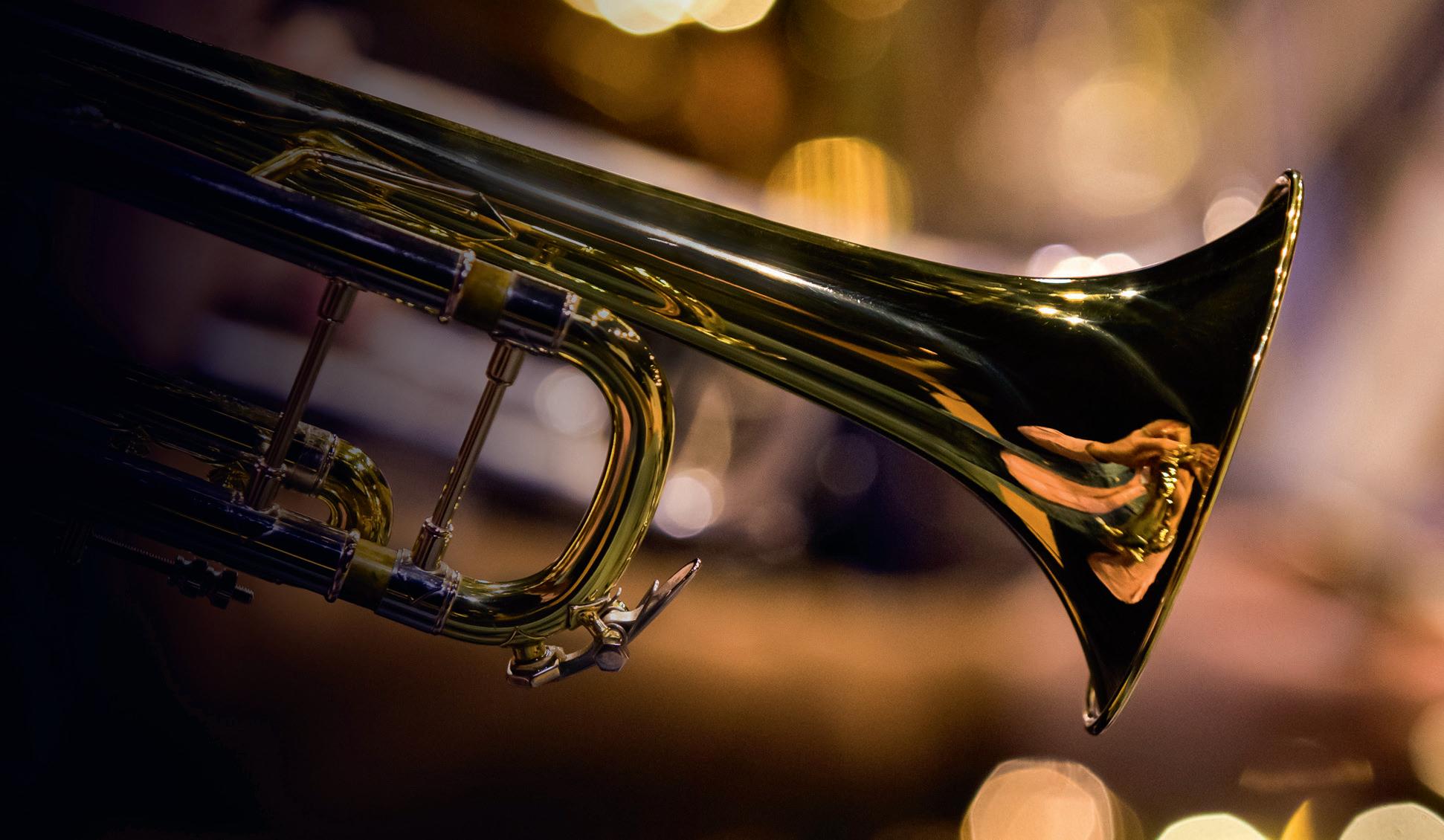Meet GCU’s new PatronSimon Halsey CBE
Simon has worked with orchestras and choirs all over the world and has been involved with numerous recordings. He has won several awards, including three GRAMMYs for Best Choral Performance - one in 2008 for a recording of Brahms’ Ein Deutsches Requiem
In 2010 Simon worked on a collaboration with Sir Simon Rattle and the American director Peter Sellars on the ground-breaking ‘ritualization’ of Bach’s St. Matthew Passion, performed and semi-staged with the Berlin Philharmonic in the beautiful space of the Grand Hall of the Philharmonie in Berlin. Simon rehearsed his Rudfunkchoir who sang off copy.
Simon has since gone on to have huge success with the Human Requiem, a project which stems from Brahms’ Ein Deutsches Requiem and was first performed in Berlin with the Rundfunkchor. He will conduct Human Requiem again in June 2026 with the choirs of Orféo Català, with whom he is principal guest conductor and choral ambassador.
To understand Simon’s unique qualities as a chorus master and to appreciate his ability to interpret the instructions of conductors such as Sir Simon Rattle set against the theatrical wishes of a director like Peter Sellars, there is an enlightening conversation between Simon Halsey and Peter Sellars to be found on YouTube. These excerpts are Peter speaking about Simon:
“You always have this brilliant way of giving the chorus a super-practical thing that creates an utterly mysterious, haunting, profound reality” and
“Your astounding radar, when you know when to move in on some pin point, and it shifts the entire meaning just because you gave this tiny little note, and the whole piece suddenly opens.”
GCU is honoured and delighted Simon has agreed to become the choir’s Patron.
Photo credit: Neue Vision
Throughout the centuries, choirs and brass bands have been instruments of community building, bringing people together to make music that inspires and astounds. Brass instruments are used to mark many spectacular and solemn occasions in life: heralds at coronations, bugles in battle, hunting horns, impending days of biblical judgement, and fanfares celebrating different disciplines.
Tonight, in an exciting programme mixing voices and brass, we embark on a journey that begins and ends in church with MacMillan’s Tu es Petrus. Along the way, we explore other sacred and secular influences side by side. There is music that is gripping and uplifting like Finzi’s God is gone up, but also music that is sensuous, intimate and occasionally light-hearted like Poulenc’s Gloria. Sir John Rutter (who celebrated his 80th birthday this year) captures all these moods in his setting of the Gloria.
I would like to remember Captain Trevor Platts ARCM psm, a thoughtful and precise Director of Music, who brought great joy and pride to many through directing bands in the British Army and the Merseyside Police.
Jack Apperley Music Director
Jack Apperley Conductor
Originally from Stourbridge, Jack grew up playing the piano and the viola, and singing. After studying at the University of Birmingham under Simon Halsey CBE, he then completed his Masters at the Royal Academy of Music with Professor Patrick Russill, graduating with distinction, winning the Sir Thomas Armstrong Leadership Prize. This year he was made an Associate of the Royal Academy of Music.
As the Associate Chorus Director of the London Symphony Chorus, Assistant Conductor of the NFM Choir in Wroclaw, Music Director of Goldsmiths Choral Union and Concordia Voices, and Conductor of Epsom Chamber Choir, Jack has established a reputation for thorough rehearsals filled with energy, humour and precision, as well as compelling concerts, championing new works alongside classical mainstays.
He is increasingly in demand as a choral director both in the UK and abroad. Recently, Jack has worked with the London Symphony Chorus, the City of Birmingham Symphony Chorus, BBC Symphony Chorus, Brighton Festival Chorus, University of Birmingham Voices and Royal College of Music Chorus. He has been engaged by some of the best choirs in Europe including le Choeur de Radio France, Gothenburg Symphony Chorus and Vocal Ensemble, and the Hungarian National Choir.
Jack is a prize-winner in several choral conducting competitions in Hong Kong, Latvia, Slovenia, and London. He has also participated in several masterclasses with the BBC Singers, Berliner Rundfunkchor, Stuttgart Kammerchor, Hungarian National Choir and St. Jacob’s Kammerchor.
In addition to his regular musical commitments, Jack is frequently engaged to lead choral workshops with choirs including Goldsmiths Choral Union and Sevenoaks Philharmonic Society and promoters such as the Buxton International Festival.
Sophie Benfield Soprano
Sophie has recently graduated from the Royal Academy of Music with a Master of Arts degree having been awarded a high classification with a diploma for her final recital. She is currently studying under Kate Paterson, John Lattimore, and Iain Ledingham.
She began her operatic career with Bedfordshire Youth Opera, performing the role of Antonia in Les Contes d’Hoffmann. Since then, she has portrayed Donna Anna in Don Giovanni, Sœur Blanche in Dialogues des Carmélites, and Marietta in Die tote Stadt as part of the Royal Academy Opera Scenes. Sophie has also appeared with Hampstead Garden Opera in their production of Tchaikovsky’s Eugene Onegin. Most recently, she made her role debut as Erste Dame in the Royal Academy Opera’s production of Mozart’s Die Zauberflöte and completed the 2025 summer season with Opera Holland Park, performing in Wagner’s Der Fliegende Holländer.
Sophie has a strong background in oratorio, having performed the soprano solos in Beethoven’s Symphony No. 9 with the Edinburgh Chamber Society, as the soprano soloist in Mendelssohn’s Elijah once at Truro Cathedral under the baton of Martin Palmer and another with Harry Bradford and the North Herts Guild Choral society, and as Gabriel in Haydn’s The Creation, conducted by Olivia Shotton with the University of Greenwich. She is also a choral scholar at St Philips Earl’s Court. She has appeared at several prestigious venues, including the Royal Albert Hall, St Martin-in-the-Fields, and Wigmore Hall as part of their FCOL series.
Affinity Chamber Orchestra
The Affinity Chamber Orchestra is a professional London-based orchestra working in partnership with choirs, composers and event organisers. Founded in early 2022 by its current musical director, Matthew Down, it performed its successful debut concert with Goldsmiths Choral Union at Cadogan Hall, the programme consisting of Cecilia McDowall’s Da Vinci Requiem (2019), Joseph Haydn’s Mass in Time of War and Peter Warlock’s Capriol Suite.
The orchestra’s players are highly skilled musicians, many of whom are respected teachers of their instruments, who perform with leading London and international orchestras, seasoned chamber groups and as soloists. The orchestra aims to showcase its musicians, bringing life to creative ideas and projects in all styles of music.
Matthew Down Musical Director
In addition to being the founder and musical director of the Affinity Chamber Orchestra, Matthew has many years’ experience as a conductor, trumpet-player and teacher. He has a broad range of musical tastes, ranging from baroque to pop, performing music with great musicians and friends being at the heart of his musical life.
The Lily Foundation‘s mission is to improve the lives of people affected by mitochondrial disease, while working towards a future where it can be effectively treated or cured.
Mitochondrial disease is an incurable genetic disorder that affects people in very different ways. It often affects babies and young children, and the long-term prognosis is poor.
Please help us continue our work raising public awareness about the disease, funding research into finding treatments, and supporting patients and their families.
Join us at Holy Trinity Church, Sloane Square on Friday 19th December at 7:30pm
Sir James MacMillan 1959 - present
Tu es Petrus (2010)
MacMillan was commissioned to write a setting of the text Tu es Petrus (Matthew 16:18) for the entrance of Pope Benedict XVI to Mass at Westminster Cathedral.
The jaw-dropping Tu es Petrus, its celebratory character and clear base in liturgical tradition, make it far more than a one-off firework. Christ calls Peter his Rock, the foundation for His Church, and gives him the keys to the Kingdom.
MacMillan is very much a Scottish composer and conductor, growing up in Ayrshire, Scotland. His Catholic faith has inspired many of his compositions.
MacMillan’s reputation was launched at the BBC Proms in 1990 with The Confession of Isobel Gowdie, a work based on the fantastical confessions and unjust trial of a seventeenth-century Scottish witch. His most performed work is Veni, Veni, Emanuel, a theatrical and demanding percussion concerto, to which an ancient advent plainsong gives a unifying thread. Other notable works include Seven Last Words from the Cross, for chorus and string orchestra, and Triduum, a triptych based on the events of Holy Week.
Almost half of MacMillan’s works use the human voice in some way. ‘I love writing for voices,’ he says. ‘I love the British choral sound. I go down the well-worn paths, but I do like to revisit these traditions and perhaps add my own character.’
Joan Tower 1938 - present
Fanfare for the Uncommon Woman, No. 5 (1993)
This work was written for the Aspen Music Festival and dedicated to the philanthropist Joan W. Harris. It is the fifth in a series of fanfares and, Tower says, ‘is inspired by women who take risks and are adventurous in their actions and goals.’
Born in New York, Tower spent her childhood in Bolivia, Chile and Peru (her father was a mining engineer) where she was heavily influenced by rhythm and percussion instruments. ‘My babysitter used to take me to these festivals … The band people would throw me a maraca or some kind of castanet or drum. That was where I started to develop a love of percussion and also dance. My music is basically about rhythm. It’s all about timing for me.’
She studied piano and composition at Columbia University, and spent the next several years as a pianist playing classical pieces - ‘I played a lot of Beethoven’ - and enjoying the physicality and rhythms of tennis.
After ten years composing under the influence of the 12-tone technique serialists, she made a dramatic change of direction stimulated by the work of Messiaen and Crumb. The jazz clubs of New York City were further inspiration for her style.
In 1972 Tower became professor of composition at Bard College and from 1985 to1988 she was composer-in-residence at the St. Louis Symphony Orchestra where she wrote Silver Ladders in 1986 (the first woman recipient of the Grawemeyer Award for Music Composition).
She describes herself as ‘A choreographer of sound’.
Giovanni Gabrieli 1554/7 - 1612
Canzon Primi Toni a8 (1597)
Sonata pian’e forte a8 (1597)
Gabrieli was organist at the magnificent St. Mark’s Basilica in Venice. He was one of the earliest composers to specify dynamics, make expression marks and specify the use of particular instruments. Both of these works were published in 1597 as part of the vocal and instrumental Sacrae Symphoniae. The Canzon Primi Toni a8 was written in the ‘call and response’ style.
Gabrieli was a transitional figure between the Renaissance and Baroque eras. His uncle, Andrea, held the position of organist at St. Mark’s while Giovanni studied music for two years in Münich, Germany. Uncle and nephew for a short time performed musical ‘duals’ on organs either side of the nave in St. Mark’s, before Andrea became ill and retired. From 1585, Giovanni was the main organist, also composing and teaching.
He was the breadwinner of the family, his sisters’ protector, which led to him accepting a further position as organist for the Scuola Grande of San Rocco church where he composed and played at mass, vespers and festival days.
In all, Gabrieli served three Venetian Doges, enabling the music for huge state occasions. His music conjures up the Byzantine style, Venetian paintings all about colour and light, glittering gold mosaics, clocks, bells and candles. There is no evidence of a marriage or children. He was devoted to his pupils, but suffered with kidney stone problems at the end of his life.
Gerald Finzi 1901 - 1956
God is gone up (1951)
This was composed for the St. Cecilia’s Day commemoration of music at St. Sepulchre’s Church in London. Evoking the imagery of Christ’s ascent into heaven, it incorporates elements of the joyous triumphant style he developed after a trip to America. Finzi wrote it shortly after being diagnosed with Hodgkin’s lymphoma, a condition that would lead to his death a few years later.
Finzi spent his early childhood in London. His father was a successful shipbroker of Italian descent and his mother was a German Jew who also composed music. The death of his father when he was seven, and the outbreak of the First World War, precipitated the family’s move to Harrogate in Yorkshire. Greatly saddened by the death of his music teacher Edward Farrar who had acted as a father figure, he took solace in the countryside and in poetry. Finzi continued his musical education under Edward Bairstow at York Minster.
Attracted by the beauty of the English countryside, Finzi moved to Painswick, Gloucestershire in 1922 where he could compose in peace. Despite being an agnostic of Jewish descent, several of his choral works incorporate Christian texts.
By the time the Second World War broke out, Finzi had lost his three brothers to illness, suicide and the war. These deaths shaped much of his life and contributed to his introverted nature.
He taught for three years at the Royal Academy of Music, but after his marriage to the artist Joy Black in 1933, they moved to the Berkshire countryside. During the Second World War, they opened their house to a number of German and Czech refugees. He founded the Newbury String Players to take live music to the villages, schools and army camps surrounding his home in Newbury. Although Finzi wrote over 100 songs, perhaps his best known work is a clarinet concerto for Frederick Thurston in 1949. An all-Finzi music festival in the Royal Festival Hall in 1954 finally acknowledged his place in Britain’s musical life.
Sir John Rutter 1945 - present
Gloria (1974)
Gloria was commissioned by the Voices of Mel Olson in Omaha, USA, and Rutter was asked to compose and conduct his work. The director of music said he couldn’t afford a full orchestra, but had an 80-voice choir and Nebraska had some good brass players. Born in London, Rutter studied music at Clare College, Cambridge in the 1960s. While an undergraduate, he conducted the college concert at Christmas, cycling round the women’s colleges to beg some extra voices to join the single sex choir. His tutor David Willcocks arranged for a work Rutter had written (The Shepherd’s Pipe Carol) to be published and recorded.
He became Director of Music at Clare College in 1975 for four years, and in 1981 he formed the Cambridge Singers. With Sir David Willcocks, Rutter edited the much-loved Carols for Choirs volumes. His most performed piece, The Lord Bless you and keep you, was written for the memorial service of his old school Director of Music at Highgate School, Edward Chapman.
He divides his time between composing and conducting and is sought after as a guest conductor for the world’s leading choirs and orchestras. He lives outside Cambridge. Rutter describes himself as a music magpie, not an explorer, ‘I take the sounds in the air, gather them in, and make something of them.’
He has been writing and publishing for 60 years. The BBC commissioned Bird Songs, which received its World Premiere at this season’s Proms.
Sir William Walton 1902 - 1983
Coronation Te Deum (1953)
Walton was delighted to be invited by the organist of Westminster Abbey and the coronation’s director of music, to compose a setting of the Te Deum for the coronation of Queen Elizabeth II in June 1953. The Te Deum was to come at the point of the ceremony when the Queen processed through the choir and nave to the west door of the abbey to greet her subjects, wearing her Crown and holding in her right hand the Sceptre and in her left hand, the Orb.
To his friend Christopher Hassall, Walton wrote ‘I’ve got cracking on the Te Deum. You will like it. Lots of counter-tenors and little boys Holy-holying, not to mention all the Queen’s Trumpeters and sidedrummers’. The work has stood the test of time, King Charles III choosing to repeat it at his own coronation in May 2023.
From the mill town of Oldham in Lancashire to the dreaming spires of Oxford, the young Walton’s life changed irrevocably as the result of his parents’ response to a press advertisement for chorister trials at Christ Church Cathedral. The local greengrocer lent Mrs. Walton the money for the train fares; Mr. Walton had drunk away what was set aside for the tickets the night before. Arriving late, the tenyear-old William was allowed to audition and, with a decent training already under his belt from his choirmaster father, was accepted
into the choir. During his time in Oxford, Walton was teased by the other choristers for his strong Lancashire accent, and later failed to graduate in his music degree specifically in music compostion. Walton always needed a deadline. In his own words, ‘I was slack about when I finished a piece’. After Oxford, he was taken in by the literary Sitwell family, and lived in their attic. Walton wrote the largescale orchestral choral piece Belshazzar’s Feast in 1931 - an early triumph - and for the coronation of King George VI in May 1937 he composed Crown Imperial.
The Second World War was a watershed period for Walton. He drove ambulances until asked not to continue ‘as too many crashed.’ He switched from serious, substantial works to writing a number of outstanding film scores, most famously the music for Lawrence Olivier’s Henry V.
Known for his many adulterous affairs, in 1948 he nevertheless proposed every day for a fortnight to Argentinian beauty Susana until she agreed to marry him, and together they lived for the next 35 years on the Italian island of Ischia enjoying their spectacular garden.
Aaron Copland 1900 - 1990
Fanfare for the Common Man (1942)
Commissioned by Eugene Goossens, conductor of the Cincinnati Symphony Orchestra, the fanfare’s title was inspired by a speech made by the American Vice-President, Henry A. Wallace, in which he spoke of the dawning of the Century of the Common Man to honour Americans serving in the Second World War. A few critics complained that Fanfare for the Common Man roused the kind of intense nationalist feelings that caused wars. The Rolling Stones, Styx, and Emerson, Lake & Palmer have since all adapted the fanfare to their own versions, and it remains familiar due to its continual re-use in television shows.
Born in Brooklyn, New York, to Russian-born Jewish immigrant parents, Aaron and his four siblings lived above Copland’s Department Store on Washington Avenue and grew up helping in the shop. In 1921 he attended the American Conservatory at Fontainebleau in France, and studied composition and orchestration with Nadia Boulanger who was pivotal in helping him develop his modernist style.
A teacher, conductor and composer weaving American folk themes together with classical forms, he provided the music for several films. In 1944 he won a Pulitzer Prize for creating the ballet music Appalachian Spring for Martha Graham.
Copland was a very private person although he loved company and had many friends. He was a mentor to Leonard Bernstein among others. Investigated by the FBI during the McCarthy era, he had left-leaning views and socialist friends, but was never a member of any political party. Copland lived a long life, but virtually stopped composing from 1970, his mental health deteriorating towards the end.
John Rutter Gloria
Gloria in excelsis Deo
Et in terra pax hominibus bonæ voluntatis. Et in terra pax pax hominibus bonæ voluntatis, Laudamus te, Benedicimus te, Adoramus te, Glorificamus te. Gratias agimus tibi
Propter magnam gloriam tuam, Gloria in excelsis Deo.
II
Domine Deus, Rex caelestis, Deus Pater omnipotens, Domine Fili unigenite, Jesu Christe.
Domine Deus, Agnus Dei, Domine Deus, Filius Patris, Rex caelestis, Rex caelestis,
Qui tollis peccata mundi, Miserere, miserere nobis, Suscipe deprecationem nostram Qui sedes ad dexteram Patris.
III
Quoniam tu solus sanctus, Tu solus Dominus, Tu solus altissimus, Jesu Christe. Cum sancto Spiritu in gloria Dei Patris, Amen.
Gloria in excelsis Deo. Amen.
INTERVAL 20 MINUTES
William Walton Coronation Te Deum
We praise thee, O God: We acknowledge thee to be the Lord. All the earth doth worship thee: The Father everlasting. To thee all Angels cry aloud! The Heavens, and all the powers therein. To thee Cherubin, and Seraphin Continually do cry, Holy, Holy, Holy, Lord God of Sabaoth; Heaven and earth are full of the Majesty of thy Glory.
The glorious company of the Apostles praise thee, The goodly fellowship of the Prophets praise thee. The noble army of Martyrs praise thee.
The Holy Church throughout all the world
Doth acknowledge thee
The Father of an infinite Majesty;
Thine honourable, true, and only Son; Also the Holy Ghost the Comforter.
Thou art the King of Glory, O Christ. Thou art the everlasting Son of the Father. When thou tookest upon thee to deliver man: Thou didst not abhor the Virgin’s womb. When thou hadst overcome the sharpness of death, Thou didst open the Kingdom of Heaven to all believers. Thou sittest at the right hand of God: In the glory of the Father.
We believe that thou shalt come to be our judge. We therefore pray thee, help thy servants, Whom thou hast redeemed with thy precious blood. Make them to be numbered with thy Saints In glory everlasting.
O lord, save thy people, and bless thine heritage. Govern them and lift them up for ever. Day by day we magnify thee; And we worship thy Name, Ever world without end.
Vouchsafe, O Lord, to keep us this day without sin, O Lord, have mercy upon us.
O Lord, let thy mercy lighten upon us, as our trust is in thee. O Lord, in thee have I trusted Let me never be confounded.
Giovanni Gabrieli Sonata pian’ e forte a8
Aaron Copland Fanfare for the Common Man
Francis Poulenc Gloria
Gratias agimus tibi
Propter magnam gloriam
Gloriam tuam.
III
Domine Deus
Rex cœlestis
Deus Pater
Pater omnipotens
Gloria.
IV
Domine fili unigenite
Jesu Christe!
V
Domine Deus
Filius Patris
Rex cœlestis
Qui tollis peccata mundi
Miserere nobis
Suscipe deprecationem nostram
Agnus Dei
Qui tollis peccata mundi
VI
Qui sedes ad dexteram Patris
Miserere nobis
Quoniam tu solus Sanctus
Tu solus Dominus Amen
Tu solus Altissimus
Jesus Christe
Cum Sancto Spiritu
In gloria Dei Patris
Amen.
James MacMillan









